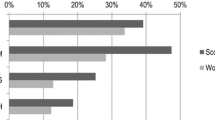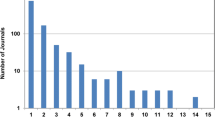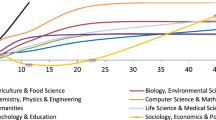Abstract
Gender disparities persist in several areas of society and scientific research is no exception. This study describes the evolution of the place of women in Russian science from 1973 to 2012, in terms of published research output, research productivity, international and national collaboration, and scientific impact, taking into account the socioeconomic, political and historic context of the country, which was marked by the fall of the USSR in 1991. The results show that gender parity is far from being achieved. Women remain underrepresented in terms of their contribution to research output and scientific impact in almost all disciplines, with Mathematics and Physics, research areas in which Russia is specialized, having the largest gap. Men and women show different collaboration patterns on the national and international level, whereas women are preeminent on the national scene, men are on the international one. Although the impact of women’s scientific output significantly increases after the fall of the USSR, the gap between both genders remains stable over time for most of the disciplines. As a result, this increase cannot be interpreted as an improvement of the women’s relative influence in Russian science, but rather an improvement of Russian science impact in general.








Similar content being viewed by others
Notes
Suffixes associated to male gender: -ov, -in, -ev, -ky, -kii, -kiy, -yi, -ny, -oy, -oi, except -tsoi and –tsoy.
Suffixes associated to female gender: -ova, -ina, -eva, -aia and –aya.
Given that pre-2008 papers do not have a link between authors and addresses, it possible that we assigned a gender to a foreign collaborator rather than a Russian author. Given the low international collaboration rate of Russian papers, however, this should not be frequent.
References
Abramo, G., D’Angelo, C. A., & Caprasecca, A. (2009). Gender differences in research productivity: A bibliometric analysis of the Italian academic system. Scientometrics, 79(3), 517–539.
Archambault, É., Vignola-Gagne, É., Côté, G., Larivière, V., & Gingras, Y. (2006). Benchmarking scientific output in the social sciences and humanities: The limits of existing databases. Scientometrics, 68(3), 329–342.
De Cheveigné, S. (2009). The career paths of women (and men) in French research. Social Studies of Science, 39(1), 113–136.
Freeze, G. (2002). Russia: A history. Oxford: Oxford University Press.
Kirchik, O., Gingras, Y., & Larivière, V. (2012). Changes in publication languages and citation practices and their effect on the scientific impact of Russian science (1993–2010). Journal of the American Society for Information Science and Technology, 63(7), 1411–1419.
Kotsemir, M. N. (2012). Publication activity of Russian researches in leading international scientific journals. Acta Naturae, 4(13), 14–34.
Larivière, V., Archambault, É., Gingras, Y., & Vignola-Gagné, É. (2006). The place of serials in referencing practices: Comparing natural sciences and engineering with social sciences and humanities. Journal of the American Society for Information Science and Technology, 57(8), 997–1004. doi:10.1002/asi.20349.
Larivière, V., Ni, C. Q., Gingras, Y., Cronin, B., & Sugimoto, C. R. (2013). Global gender disparities in science. Nature, 504(7479), 211–213.
Larivière, V., Vignola-Gagné, E., Villeneuve, C., Gélinas, P., & Gingras, Y. (2011). Sex differences in research funding, productivity and impact: an analysis of Québec university professors. Scientometrics, 87(3), 483–498.
Lewison, G., & Markusova, V. (2011). Female researchers in Russia: Have they become more visible? Scientometrics, 89(1), 139–152.
Milard, B. (2009). L’héritage soviétique dans la nouvelle organisation de la science en Russie. Revue d’anthropologie des connaissances, 2(3), 391–411.
Moed, H. (1996). Differences in the construction of SCI based bibliometric indicators among various producers: A first over view. Scientometrics, 35(2), 177–191.
National Science Foundation (2006). Science and engineering indicators. Chapter 5: academic research and development. Data and terminology. http://www.nsf.gov/statistics/seind06/c5/c5s3.htm#sb1. Accessed 8 May 2014.
OECD (2013). Jobs and wages. http://www.oecd-ilibrary.org/sites/factbook-2013-en/13/02/02/index.html?itemId=/content/chapter/factbook-2013-106-en. Accessed 8 May 2014.
Pislyakov, V., & Gokhberg, L. (2008). Assessing the relative standing of Russian science through a set of citation and publication indicators. Excellence and emergence. Book of abstracts. 10th international conference on science and technology indicators (pp. 400–403). Vienna: ARC.
Savelieva, I. M., & Poletayev, A. V. (2009). Publications of Russian humanity scholars abroad: A sociometric analysis. Journal of Educational Studies, 4, 199–217.
Suchanska, M., & Czerwosz, E. (2013). Women in technical universities in Poland. Paper presented at the AIP Conference Proceedings.
Witz, A. (1992). Professions and patriarchy. London: Routledge.
Xie, Y., & Shauman, K. A. (2003). Women in science: Career processes and outcomes (Vol. 26). Cambridge: Harvard University Press.
Acknowledgments
A preliminary version of this paper will be presented to the STI 2014 conference.
Author information
Authors and Affiliations
Corresponding author
Rights and permissions
About this article
Cite this article
Paul-Hus, A., Bouvier, R.L., Ni, C. et al. Forty years of gender disparities in Russian science: a historical bibliometric analysis. Scientometrics 102, 1541–1553 (2015). https://doi.org/10.1007/s11192-014-1386-4
Received:
Published:
Issue Date:
DOI: https://doi.org/10.1007/s11192-014-1386-4




